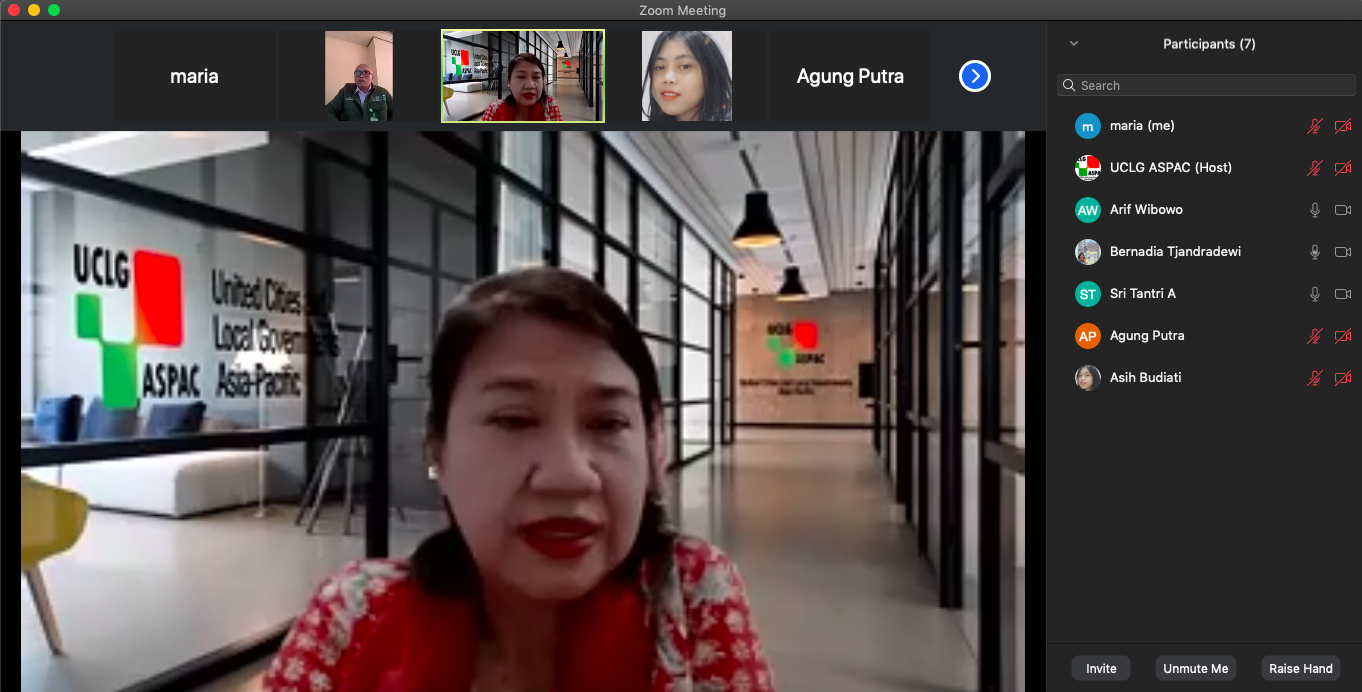The United Cities and Local Governments Asia Pacific (UCLG ASPAC) and the Indonesia Ministry of Environment and Forestry (MoEF) discussed a Memorandum of Understanding (MoU) establishing plans to pursue collaboration in the Climate Resilient and Inclusive Cities project implementation, during a virtual meeting on Wednesday (24/6).

Representatives from the MoEF are the Director of Climate Change Adaptation Sri Tantri Arundhati, Deputy Director for Identification and Assessment of Climate Change Vulnerability Arif Wibowo, Deputy Director of Adaptation Planning Agung Putra and Head of Law and Technical Cooperation Lawin Bastian.
In her opening remarks, the Secretary General of UCLG ASPAC Dr. Bernadia Tjandradewi said that the MoU underpins a framework of collaboration on joint action and knowledge transfer to promote climate resilient and inclusive cities. “We would like to involve the MoEF in the CRIC Project. We already have an ongoing cooperation with the Ministry through previous programme dealing with climate and waste management. Our latest collaboration through the CRIC Project will reiterate our commitment to tackle climate change issues,” she said.
The CRIC Project launched in January 202o is a five-year programme funded by the European Union and implemented by the UCLG ASPAC, Pilot4DEV, ACR+, ECOLISE, AIILSG and Gustave Eiffel University. The project will bring positive contribution to achieve development target and the national government commitment at a global level, as stated in NDCs.
Presenting the project, CRIC Project Coordinator Putra Dwitama said that the project overall goal aims to promote a long lasting cooperation between cities, officials, civil society organisations and research institutes. “The implementation will take place in ten pilot cities in Indonesia. Through the project, we can collaborate to help cities achieve its sustainable development agendas,” he said.
The ten pilot cities are Pekanbaru, Pangkal Pinang, Bandar Lampung, Cirebon, Banjarmasin, Samarinda, Mataram, Kupang, Gorontalo and Ternate. Officials from these cities will receive technical assistance to incorporate climate resilience into their development agendas and policies.
CRIC Project Manager Asih Budiati said that support from the MoEF is of paramount importance to ensure project success. “We would like to explore collaboration possibilities. As an example, there will be approximately 30 focus group discussion sessions and the MoEF can support the project by deploying its technical staff. In addition to resource mobilization, MoEF can also support us in terms of tools verification and project monitoring and evaluation,” she said.
Addressing the presentation from UCLG ASPAC, Director of Climate Change Adaptation Sri Tantri Arundhati said that the MoEF is committed to supporting the project. “City resilience is part of our commitment to emission reductions and the project can contribute to Indonesia’s NDC target. We hope that the project can come up with city resilience indicators that we can adopt for future policies,” she said.
In principal, both UCLG ASPAC and the MoEF agreed on partnership to promote climate resilience at city level. Following this meeting, UCLG ASPAC will prepare the MoU to outline concrete cooperation plans.

